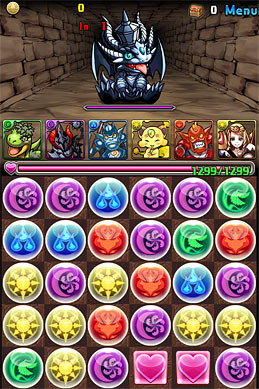One of the most absurd stories this year has been the rapid rise of Gung-Ho, the Japanese gaming company that saw its stock surge by more than 6,000% in a single year because of one hit mobile game called Puzzle & Dragons.
The company is now worth $14.4 billion on public markets. That’s more than twice as much as Electronic Arts is worth and about seven times Zynga’s market capitalization. For a brief moment, GungHo even surpassed Nintendo’s valuation earlier this month.
GungHo’s rise came through Puzzle & Dragons, a title that earned it an estimated $113 million in April — solely in Japan. It also recently hit 15 million users just a week ago, primarily in Japan.
The game itself is a puzzle matching title. The player has to line up several matching tiles in a row and they collect cute animal characters as they level up and battle other monsters and bosses.
The company’s success underscores a big shift in power between mobile gaming platform providers like DeNA and GREE, which ruled in a predominantly feature phone era, and first-party game developers, which don’t need to rely on an extra distributor on top of Apple’s iOS or Google’s Android platforms.
For the company itself, which is 300 employees strong, Puzzle & Dragons’ massive success has begged the question from rival developers — “What’s your secret? How’d you do it?”
 But producer Daisuke Yamamoto could only say, actually half-seriously, “Listen to your wife.”
But producer Daisuke Yamamoto could only say, actually half-seriously, “Listen to your wife.”
After being originally inspired by another Match-3 game called “Dungeon Raid,” he created a concept with more Dragonball-like art and a wizard-like theme.
Then he just listened to a lot of the improvements his wife wanted in the game.
Initially, it was just a team of four with him as the producer and other programmers and designers. It took a few days to develop the game, and then six and a half months until the company felt it was strong enough to go live.
Among the many changes his wife wanted: the ability to move a stone around the entire game board, instead of only one slot over at a time. She also wanted larger stones on the screen. He said that womens’ longer fingernails often get in the way of playing the game, so they need to be bigger to make the UI more player-friendly.
As the game grew into a cultural phenomenon, it kept taking GungHo’s servers down. The company started giving away virtual stones as an apology, giving rise to the word, ‘Wabishi,’ which is a combination of the Japanese words for ‘stone’ and ‘apology.’
He also said the company doesn’t internally focus on quantitative metrics that much, and instead relies on qualitative feedback from Twitter. That’s a pretty big difference from other freemium gaming companies, which focus on user funnels and retention rates over several days to a week to a month.
“Japanese people are really conservative. They don’t disclose their actual names,” said in an interview at Supercell’s Free Your Play event in Helsinki last week. “Because you can use a nickname on Twitter, it’s a much more effective way to listen than Facebook.”
As revenues ballooned, GungHo’s stock has gone on a rampage, growing from a valuation of just over $200 million a year ago to $14.4 billion today.
But Yamamoto says internally they try not to pay attention to the company’s soaring valuation. “We’re try not to focus on the stock prices. We just focus on creating games and that’s all we do,” he said.
He also said that even though GungHo is now worth more than longtime mobile gaming giants DeNA and GREE, they don’t intend to go for any kind of platform play.
“We’re pretty much not in favor of platforms like [DeNA’s] Mobage and GREE. DeNA and GREE are IT companies. They are not gaming companies. All they focus on is how much revenue they will have,” he said. “But for us, we’re a gaming company. We emphasize game creatives. If all Japanese gaming companies started to focus on the creative side, it would be a really good move for the entire industry.”
He says to celebrate the game’s success so far, his team “just drank beer and ate pizza.”
He said his life hasn’t changed that much since the game became a massive hit. But he’s hoping that he can build out stronger branding for Puzzle & Dragons. “I’ve always wanted to do a game with good characters and IP [intellectual property],” he said.
So it wouldn’t be that surprising to see GungHo come out with merchandising and licensing deals akin to what we’ve seen with Angry Birds-maker Rovio or Cut The Rope-maker Zeptolab.
The company is also focused on improving localization for Western markets. Currently, the game seems to have done some basic translation work but the tutorials and art could probably be localized more. The company just announced a partnership with Finland’s Supercell to build in a bunch of exclusive in-game features that will appear in both Puzzle & Dragons and Clash of Clans.
“We’re not really satisfied,” Yamamoto said. “We’ve just been quiet so far, but we’ll be aggressive from now on.”
